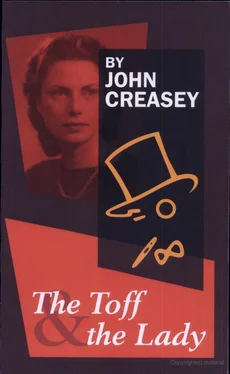John Creasey - The Toff and The Lady
Здесь есть возможность читать онлайн «John Creasey - The Toff and The Lady» весь текст электронной книги совершенно бесплатно (целиком полную версию без сокращений). В некоторых случаях можно слушать аудио, скачать через торрент в формате fb2 и присутствует краткое содержание. Жанр: Старинная литература, на русском языке. Описание произведения, (предисловие) а так же отзывы посетителей доступны на портале библиотеки ЛибКат.
- Название:The Toff and The Lady
- Автор:
- Жанр:
- Год:неизвестен
- ISBN:нет данных
- Рейтинг книги:5 / 5. Голосов: 1
-
Избранное:Добавить в избранное
- Отзывы:
-
Ваша оценка:
- 100
- 1
- 2
- 3
- 4
- 5
The Toff and The Lady: краткое содержание, описание и аннотация
Предлагаем к чтению аннотацию, описание, краткое содержание или предисловие (зависит от того, что написал сам автор книги «The Toff and The Lady»). Если вы не нашли необходимую информацию о книге — напишите в комментариях, мы постараемся отыскать её.
The Toff and The Lady — читать онлайн бесплатно полную книгу (весь текст) целиком
Ниже представлен текст книги, разбитый по страницам. Система сохранения места последней прочитанной страницы, позволяет с удобством читать онлайн бесплатно книгу «The Toff and The Lady», без необходимости каждый раз заново искать на чём Вы остановились. Поставьте закладку, и сможете в любой момент перейти на страницу, на которой закончили чтение.
Интервал:
Закладка:
“Don’t keep harping on Andrew!” Gwen cried.
Rollison said: “There has been an attempt on your life, now on your mother’s, your father is missing and may be dead, the matron of the Lawley Nursing Home has been murdered”
Gwendoline screamed: “No! No!”
“In cold blood, not very long ago,” said Rollison.
Gwen stood up slowly, as if her limbs were operated mechanically. She took out a lighter and lit her cigarette, staring at him all the time. The room was very quiet.
“Who was the matron?” Rollison asked, gently.
“Is there—is there no hope for her?” Gwendoline asked.
“None,” said Rollison.
Gwendoline stepped to the window and looked out. Her eyes were half-closed, and looked too hot for tears. The cigarette drooped from her lips and smoke curved upwards, making her close one eye completely.
She said: “That matron is—was—a lifelong friend of mother’s. Mother financed the nursing home. David knew about it.” Her voice was low-pitched and monotonous. “Then someone found out. Pomeroy. I don’t know what influence he has over father, but he persuaded father to let the nursing home be used for—for people who were not ill. People who were supposed to be “resting”. I don’t know a great deal about it, except that father was uneasy. Violet—the matron—frequently protested, but there was nothing we could do; father insisted. Once or twice we knew that men or women wanted by the police were there under assumed names. It seemed madness, but—father impressed it upon us that we must not tell the police or make difficulties. So we let it go on.”
She paused, but Rollison did not interrupt.
“It has been happening for over a year now,” said Gwendoline, drearily. “It has been a constant source of anxiety, but the real worry has been David. Why did he let this man tell him what to do? If it were known that a man in his position was doing such things, it would ruin him. We were constantly afraid, and although he pretended that there was nothing to worry about, we knew that he was desperately worried. We tried to find out why, but couldn’t. It started from the time that Pomeroy came to see him. Many queer things happened from that time onwards. He transferred some of his business to Pomeroy, Ward & Pomeroy. He used them as the accountants and solicitors for the various charities which mother—mother tries to help. It didn’t seem to matter what Pomeroy wanted, he let them have their own way. I think they know where he is now.”
Into a pause, Rollison said:
“Pomeroy made you keep away from me, didn’t he?”
“Yes.”
“Why did you obey him?”
“Isn’t it obvious? We were afraid for father—we did not know what harm Pomeroy could do. And now Vi is dead, there will be an inquiry, everything will come out.”
“Are you sure that you don’t know what?” demanded Rollison.
“Yes,” she said. “Yes, I’m not lying now. There is no point in lying. The police will find out what happened at the nursing home, they will learn that mother financed it, they will ask questions—questions—questions! I’ve hated the sight of a policeman since this happened, I’ve hated the sight and mention of them!”
“The police will do nothing that isn’t necessary and won’t rake up muck for the sake of it. If a thing is done under coercion, the police don’t take such a serious view. That is, for crimes short of murder. Have there been any mysterious deaths at the nursing home?”
“No,” Gwen said, and then added almost inaudibly: You know what violence there has been.”
“You mean the attempt to kill the mystery lady?”
“Yes.”
“Did you know about it beforehand?” he asked, gently.
“I haven’t sunk as low as that,” she said. “No, but I knew afterwards that Pomeroy was aware of it. I heard Pomeroy talking to someone on the telephone. He had arranged that a new nurse, Armitage, should be engaged—that was done through father’s influence. I didn’t hear all the conversation, but I gathered that she was to be blamed for it. He had some particular reason for that, I don’t know what it was.” She turned and looked at him steadily. “If she had been arrested I would have told you, if not the police. Mother and I were quite determined, but when she was not affected, we did nothing. It seemed as if the police discovered the man who did it—did they?”
“Yes,” said Rollison. “His name was Shayle, Marcus Shayle.” When Gwen showed no interest, he went on: “A man of about twenty-seven or eight, pleasant-looking, with a round face and fair, curly hair. Does that sound familiar?”
“No,” said Gwen.
“You’ve never seen such a man with Pomeroy?”
“No.”
“All you know about that, then, is that Pomeroy wanted the woman dead, and also arranged, or tried to arrange, that someone else should be found guilty of her murder,” said Rollison. “You didn’t get any indication of the reason why he wanted that done?”
“No.”
“Gwen,” said Rollison, after a pause, “you have shown that you hate this woman, and you knew that someone wanted to murder her. If this story comes out, and it may well do so, it might be thought that you condoned it. You haven’t yet told me why you hate her so much. You must.”
“And then you will go and tell the police.”
“I shall tell them nothing unless I know it will save life,” said
Rollison.
She looked at him very steadily, before she said.
“Pomeroy always talked of her as the Countess. I hate Pomeroy more than I thought it possible to hate anyone! I heard him planning to have the Countess arrive here, pretend to be suffering from loss of memory, and be taken into the Nursing Home.”
“And then you heard him rejoice in the attempt to murder her.”
She said: “ Are you a fool? It wasn’t really an attempt, I thought it was at first, but it wasn’t. She was made ill. but that was only so that she should win our sympathy. Don’t you understand? The whole elaborate plot was staged so that she could worm her way into our confidence and into father’s. She had already seen him in secret. I don’t know what they are planning. I do know that she was taking some important part in it. The very fact that there was an attempt to murder her is proof enough that she was to win our sympathy, and”
“Steady,” said Rollison. “You’re going too fast and getting illogical.”
“Isn’t it obvious?” demanded Gwen.
“It’s far too complicated. I think they wanted to kill her, and I think they were somehow prevented from doing so. And that is not only because I like the lady,” he added lightly, and he gave her the impression that he was much happier, “but I think I’m beginning to see the light. Tell me, did your mother ever see the so-called countess?”
“Once,” said Gwen. “We were out together, and I pointed her out.”
“Was she alone?”
“No, she was with Pomeroy.”
“Did he see you?”
“I think so. We ignored him. We have never acknowledged him when it was avoidable.” She stubbed out the cigarette and lit another.
Rollison said: “You and your mother saw her at the office or in the street, and apparently because you had seen her, probably because you pointed her out when she was with
Pomeroy, Pomeroy and his friends want you dead. You are still in some danger, Gwen.”
“It—it doesn’t make sense!”
“It makes more sense than some suggestions I’ve heard,” said Rollison. “Now, listen to me. There is danger, and there is only one way of avoiding it—by having the police in the house. You have a good excuse—the attempt to kill your mother.”
“We can’t” began Gwen.
Читать дальшеИнтервал:
Закладка:
Похожие книги на «The Toff and The Lady»
Представляем Вашему вниманию похожие книги на «The Toff and The Lady» списком для выбора. Мы отобрали схожую по названию и смыслу литературу в надежде предоставить читателям больше вариантов отыскать новые, интересные, ещё непрочитанные произведения.
Обсуждение, отзывы о книге «The Toff and The Lady» и просто собственные мнения читателей. Оставьте ваши комментарии, напишите, что Вы думаете о произведении, его смысле или главных героях. Укажите что конкретно понравилось, а что нет, и почему Вы так считаете.












